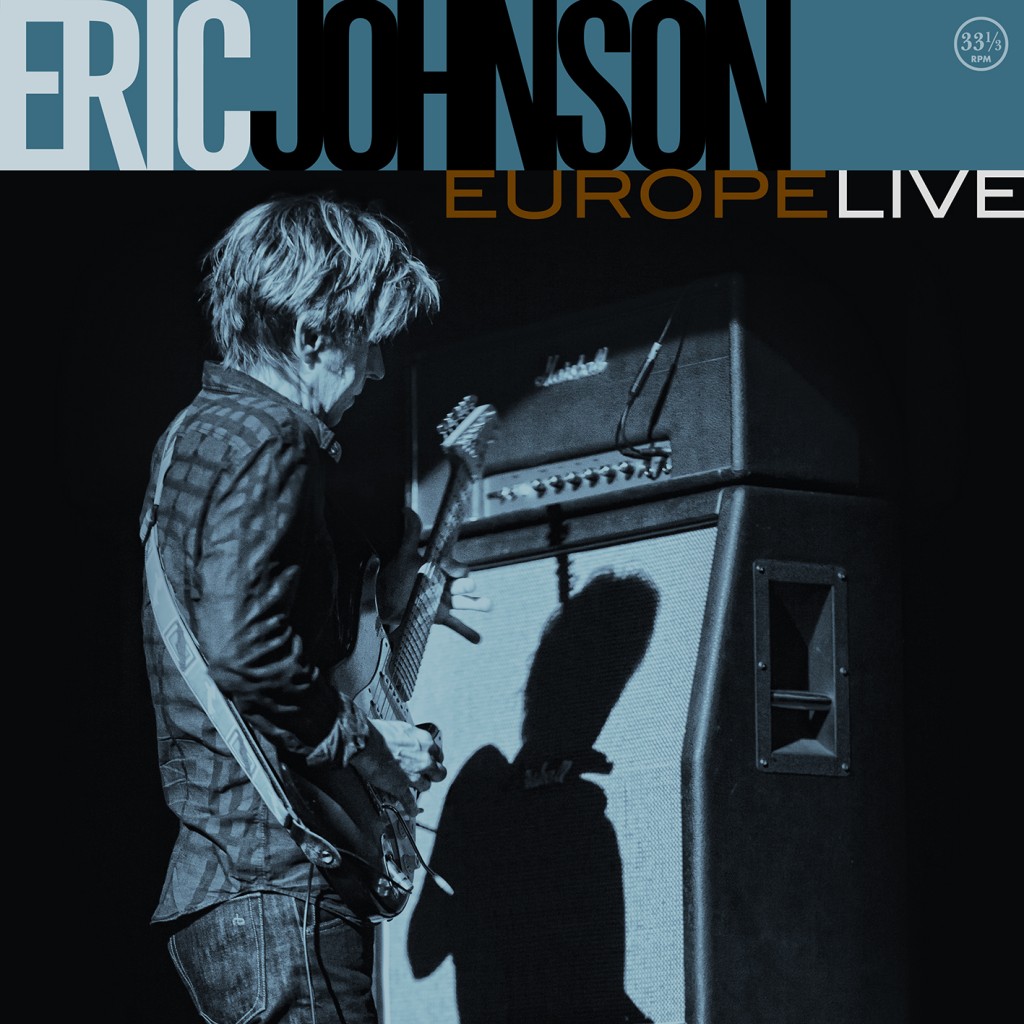By: Robert Cavuoto
 Guitar extraordinaire, Eric Johnson, will be releasing a collection of 14 live tracks recorded in Europe, simply entitled, Europe Live, on June 24th.
Guitar extraordinaire, Eric Johnson, will be releasing a collection of 14 live tracks recorded in Europe, simply entitled, Europe Live, on June 24th.
Along with his collection of his classic songs, Eric incorporated two new tracks for his fans, “Intro”, a song that opens the set, and an encore rock and roll jam inspired by a friend who knew Eric loved boating and water skiing called, “Evinrude Fever”.
While touring Europe the idea of creating a live CD was suggested by his label, so three shows were recorded. A majority of the recordings were captured at Amsterdam’s Melkweg, while other songs were recorded in Germany at – Die Kantine in Köln and Bochum Zeche and the Paris show at New Morning.
The combination of Eric’s blues bravado, raw riffing, and signature tone and technique on Europe Live allow you to truly enjoy this truly great musician.
The songs encapsulate his career and reflect his artistic passion and enormous talent. Highlights include, the 11-minute classic, “Last House On The Block”, “Manhattan” and, of course, the captivating, “Cliffs Of Dover”.
I had a truly inspiring conversation with Eric about Europe Live , his next big “super group” and his gift of playing guitar.
******
Robert Cavuoto: Tell me about your new live CD, Europe Live, did you take a traveling, mobile recording studio out on the road with you to Europe?
Eric Johnson: When we were overseas, we really weren’t planning on making a live record. One day, Ed Van Zijl, of Mascot Label Group’s Provogue called me call up and said, “Hey, do you want to tape a few of your shows just to see if we get anything and maybe do a live record?”
I said, “Well, why not?”
They just set up a bunch of mikes and had some computer gear backstage, so I never even saw them. They went around in a little truck for three dates and recorded us, and it was so off-the-cuff. We didn’t plan it, and you can tell by listening to the CD.
I’m not like, “Hey, how are y’all tonight; we’re recording.”
I almost forgot about it. In hindsight, I wish I’d made a little bigger deal about it and talked to the audience. When we got home, some of the stuff was not very good while some of it was like, “Wow, that’s really pretty good.” From that point we said, “Let’s see what we can do.”
So, between the three shows, we were able to put together a nice live recording.
 Robert: Maybe you were better off not remembering that you were being recorded. It might have caused some nervousness.
Robert: Maybe you were better off not remembering that you were being recorded. It might have caused some nervousness.
Eric Johnson: There’s definitely some truth to that. I think that can work in your favor a little bit.
Robert: Do you find that certain songs are more popular in different parts of the world?
Eric Johnson: I don’t know. I think everybody responds the same way. When something is good, people are going to get it. If something has a vibrancy, and impactful and emotional, I think there’s a universal appreciation. I know that there are certain songs of mine that people like better than others.
Robert: How much flexibility do you have in changing up your set list from show to show?
Eric Johnson: I don’t change as much as maybe I should.
We just had a meeting a few days ago. We’re going out and doing a three-week tour in August. We said, “Hey, let’s work up more songs than we need so we can change it more. And also, I think that would be cooler to do.
Nowadays with You Tube and everything, it shows up the next day. And it would be nice to have more variance in the set. There’s so much improvisation in each song, they’re never the same every night; they’re always different. But having said that, I’m thinking that maybe I need to loosen that up a little more, before I just throw different stuff in.
Robert: That leads me into my next question. Do you find some of your classic songs take on a whole new life the longer you play them and evolve as a player?
Eric Johnson: I think that there’s that opportunity, and why not?
If you have more fun, I think the audience will have more fun.
I’m working on a record right now, collaborating with Mike Stern, my guitar player from Miles Davis. We’ve done some touring and we finished this record. We’ve reworked some of his songs as well as my songs, and we were much more liberal about rearranging them and leaving more open sections and changing them.
First off, I noticed that the audience doesn’t mind that at all; in fact, they kind of like it. And it’s a lot more fun for me. I think I kind of operate on this thing like, “Oh, here’s a song; let me perform it and here’s my little 30-second part where I’ll improvise,” and I think at the end of the day, who’s counting? Who’s looking that close? Really, it’s about whether it’s great or not.
I think from some viewpoint we look at it like everything we do in life – we’re creative – it’s almost like we’re the ones who are putting all the guidelines on ourselves.

Robert: You have two new songs on the CD, and one of them is about outboard motors. How does this love of outboard motors, call “Evinrude Fever” transcend into a song?
Eric Johnson: That song is really just a rock and roll jam. It’s not any magnificent piece of music. It was just an encore piece. It’s just kind of a high-energy rock jam.
A close friend of mine many years ago said, “You should write an instrumental called, “Evinrude Fever.” Some guy who’s just crazy and has to be out water skiing and he’s out of control. I’ve loved water skiing ever since I was a kid and I laughed when he said that. He’s passed away since then. I have fond memories about him just thinking about it.
I never did write a song particularly with that title, so when it came around to this jam, I couldn’t think of a name so I said, “I’m gonna use the name my friend suggested.”
Robert: That’s a great tribute to your friend.
Eric Johnson: One day I can remember telling him, “Man, I haven’t been skiing all summer. I want to go skiing.” He said, “You’ve got Evinrude fever.”
Robert: What gear do you take out to Europe, and is it different than what you would take out on the road in the U.S.
Eric Johnson: It probably should be, because I’d save myself a lot of money. I ship all my gear over there and tote it around. It ends up eating away most of whatever I make. It’s very expensive, but yeah, I just take my rig. But I’ve been trying to get a smaller rig that has the same sound. So, if I do decide to do that, at least it’s a smaller amount.
Robert: Do you ever worry about equipment getting lost in transit overseas?
Eric Johnson: I do, but I’ve gotten rid of a lot of my gear. I’ve still got a collection of guitars, but I probably own 16 guitars now. A lot of the guys own 40 or 50. I had twice that many, and it’s kind of like you’re saying, “Oh, this is a real cool vintage beech. It’s really great. Let’s stick it in the closet and I’ll get instrument #B to use on the road.”
You know, if I’m going to own this guitar, I should play it. I don’t want to worry about if it gets lost or stolen. That’d be a drag for me.
A major collector is different. But for me, the reason I bought it is that it sounded great. Why should I buy a great instrument that sounds great, stick it in the closet and never use it? I just felt silly about that for myself, personally. It’s no commentary on telling people that collect instruments.
I just went, “You know what? I’m going to get rid of any and all of this stuff that I don’t use, even if it’s a little rare or precious, I’m going to use it; life’s too short.
Robert: Which guitar did you take with you on the road to Europe?
Eric Johnson: I took a ‘57 Strat last time I went over there. Of course, I carry that with me. I sent a Marshall and a Fulton-Webb amp and a couple of Deluxe Reverbs.
Robert: Have you ever considering forming a “super group” with a big name vocalist, bassist, and drummer?
Eric Johnson: That’s kind of why Mike and I got together. We wanted to join forces and see what kind of alchemy that would be.
To me, a supergroup would be more along the lines of that. If I’m going to do a super group, I would like to find musicians who challenge me and I can learn from – and vice-versa, in order to get more expansive in the music.
Mike Stern is such a great jazz player. I’m learning a lot just playing with him and the juxtaposition of our styles – it’s really complementary in an interesting way. I’m kind of interested in exploring that. I’ve always dreamed of finding some incredible lead singer, like a Paul Rodgers.
Robert: One of my favorite songs of yours is, of course, “Cliffs of Dover.” Did you realize the impact that song would have 30 years from when you wrote it and how big it would become?
Eric Johnson: No. I actually wrote it years before it came out. It was a song I just wrote in five minutes. It just kind of came to me; one of those gifts from the universe.
In fact, when I did my first record before the record that it came out on, the producer didn’t want to record it. He didn’t really like it. He was like, “Nah, we don’t really want to do this one.”
To be honest I didn’t really think that much of it. We had plenty of songs. Then the second record, because I’d had audience response from it, I decided to record it and we put it out. Capitol Records at the time had no plan to promote it, whatsoever.
But there was one guy, named Jeffrey Shane at Capitol, who heard it and went, “God, I love this song. I want to do something with it.”
And we’re like, “Well, whatever.” He started going around radio stations, and they got such a good response that one thing led to another. He was kind of solely responsible for lighting a fire, because there was no plan for doing anything with it.

Robert: It makes you wonder how many other songs of yours which never got recorded could have been monstrous.
Eric Johnson: Man, it’s true, you know people respond to what they like, and I think if you do something really great, you’re going to get a number of people to respond to it. It’s subjective really.
I couldn’t get arrested before it. It was like there was this one guy at Capitol who said, “Man, I love this record. I’m gonna do it.” He had so much conviction, because it moved him so much. And everybody else there was like, “What’s your problem, dude?” But he went out and went to bat for me. It’s like godsend. It’s like if you have something this decent and you get more people to respond the same way he does, all the sudden you have something.
You gotta have somebody championing your cause or have the conviction to do it, or you have to have it yourself. I think we run into a lot of predicaments because we’re not honest with ourselves.
If I want to sit around and pump myself up or hype myself up that I’ve got the next “Eleanor Rigby,” or “Sergeant Pepper,” and I want to point fingers why people aren’t freaking out. You have to take responsibility for coming up with something brilliant in hope that somebody’s conviction hears what you hear. But first and foremost, you have to take responsibility. We’re responsible as artists; we can’t sit in a bubble and just hype ourselves, “Oh, I’ve got something really great.” One year you just may not; that’s going to have an impact on people.
Robert: When you’re doing a studio album, is there a lot of it improvising like what you just described, or do you have a plan laid out?
Eric Johnson: Usually we have a laid out plan. But, like the old adage, “The best laid plans . . .”
And then it totally changes when you get in the studio. In fact, you’re lucky if it changes, because if you go in all stiff, and you have it all figured out, it’s going to sound that way when you finish it. If you go in, regardless of how together you are or how prepared, that’s great, and the more prepared the better. But, you have to be pliable to let something unexpected happen.
If I went out to dinner with my wife and we sit at the table and they’ve already got everything they’re going to say to each planned out, it’s not going to matter what you or the other person says. You can have everything planned, but you’re responding to and improvising off other people. Music is the same way.
So, there are all kinds of little, funny gusts of wind that happen, and if you hold so tight that you get upset when that happens because it’s screwing up your agenda, then you’re limiting yourself. But if you go, “Wow, maybe this is grace from the universe,” and you get something entirely bigger and better than you ever dreamed possible, so you’ve got to be a little pliable.
It’s good to be prepared, and I’ve been such a stickler in the past that it’s been too stiff, but I’m getting to the point now where I’m kind of bored with that. It’s almost like what else can happen if I get out of the way?
Robert: Wow, what an insightful way to look at things. How do you avoid repeating yourself from album to album, particularly when you’re doing instrumentals and improvising?
Eric Johnson: There’s probably a lot of repetition there. I think the more you experiment, you allow yourself to try something different.
Robert: We talked a little more about the “Cliffs of Dover” being a gift. How much of your playing is a gift and how much is sweat equity? You’re such an amazing player, and an inspiration to so many guitarists.
Eric Johnson: I think it’s a gift. It’s like some consciousness you’re able to perceive and the idea of playing an instrument. That’s a beautiful gift. I think the part that we have to do is the sweat and the practice. So, there’s a lot of work to it, but somehow, somewhere in the very beginning, we were given that perception that gave us so much passion, or excitement or inspiration, so that we were motivated to do the work.
